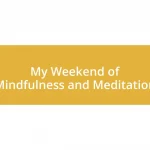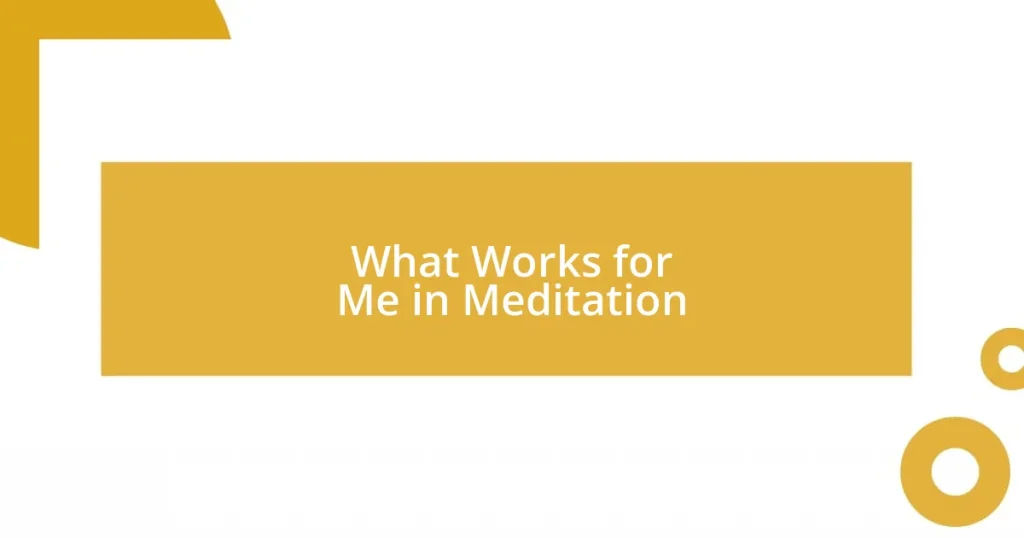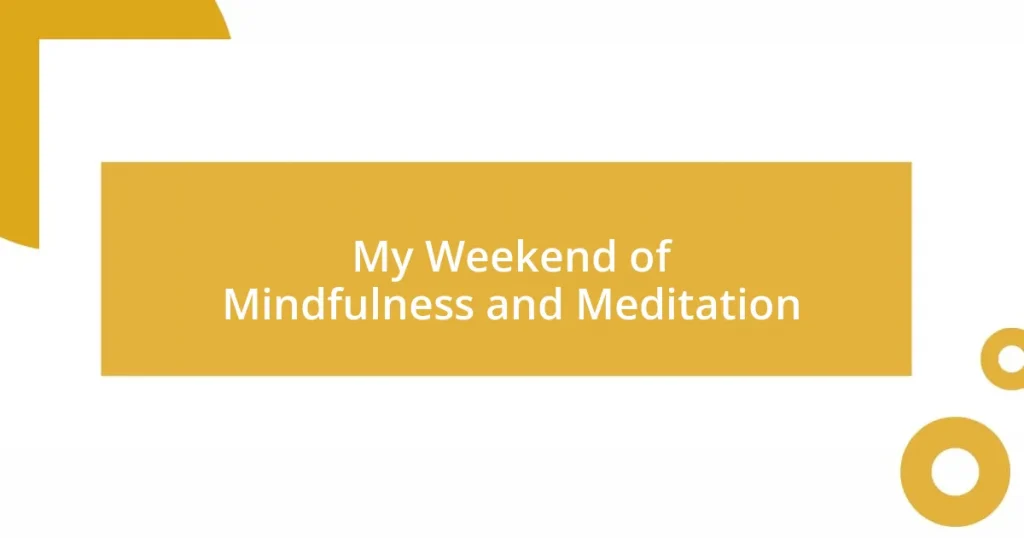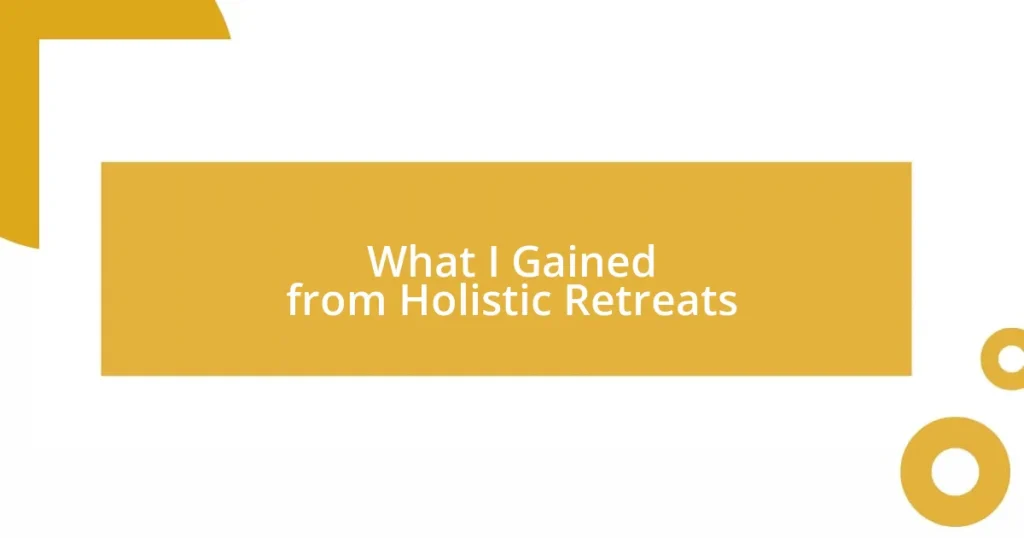Key takeaways:
- Meditation is a practice of mindfulness that helps connect with one’s inner self, requiring time to develop a meditative mindset.
- Regular meditation significantly reduces stress, enhances emotional well-being, and improves focus and concentration.
- Finding the ideal meditation style involves experimentation, with options like mindfulness, guided, loving-kindness, and movement-based meditation.
- Creating a dedicated meditation space and establishing a consistent routine can greatly enhance the meditation experience and personal growth.
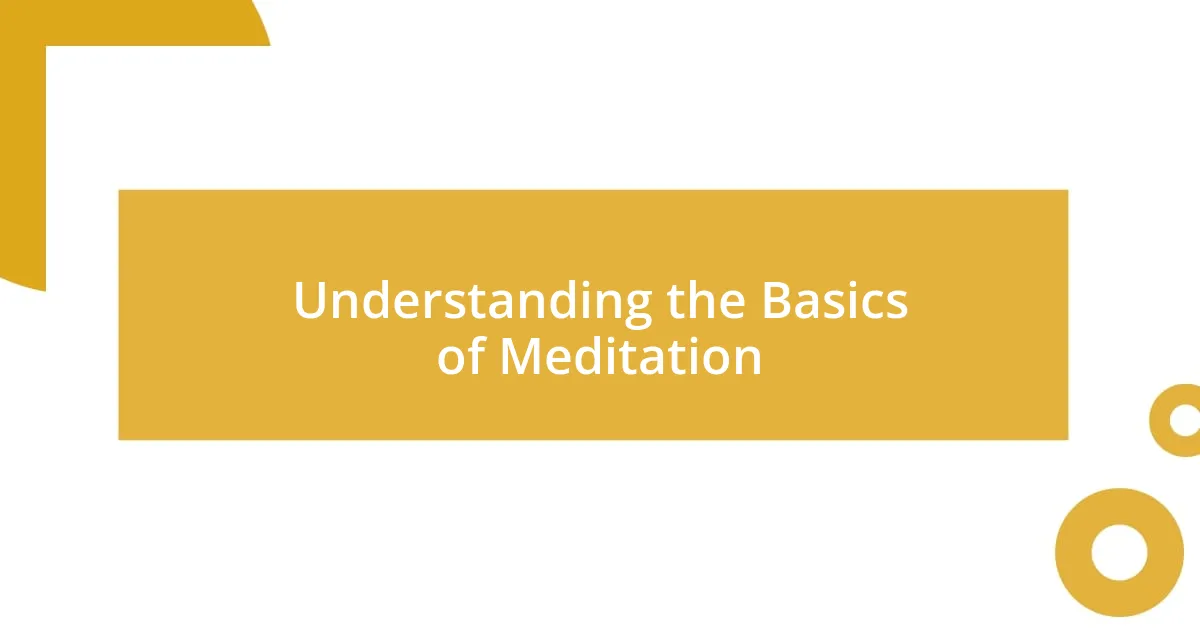
Understanding the Basics of Meditation
Meditation is much more than just sitting quietly; it’s a practice that helps us cultivate mindfulness and connect with our inner selves. I remember my early attempts at meditation, feeling frustrated because my thoughts raced like they were in a marathon. Have you ever felt like your mind just won’t quiet down? That’s entirely normal—it takes time to foster a meditative mindset.
At its core, meditation is about paying attention, whether it’s focusing on your breath or observing your thoughts. There was a moment during one of my sessions when I finally surrendered to the flow of thoughts instead of resisting them. In that space, I discovered something profound: each thought was just a fleeting visitor. It’s fascinating how something so simple can lead to profound realizations about our life and emotional state.
Understanding the basics also means recognizing that there are various styles of meditation—each can cater to different personal needs. I often lean towards guided meditations when I seek a direction or purpose during my practice. Do you have a preference, or are you still exploring? Whatever your choice may be, the beauty lies in discovering what resonates with you and enhances your journey.
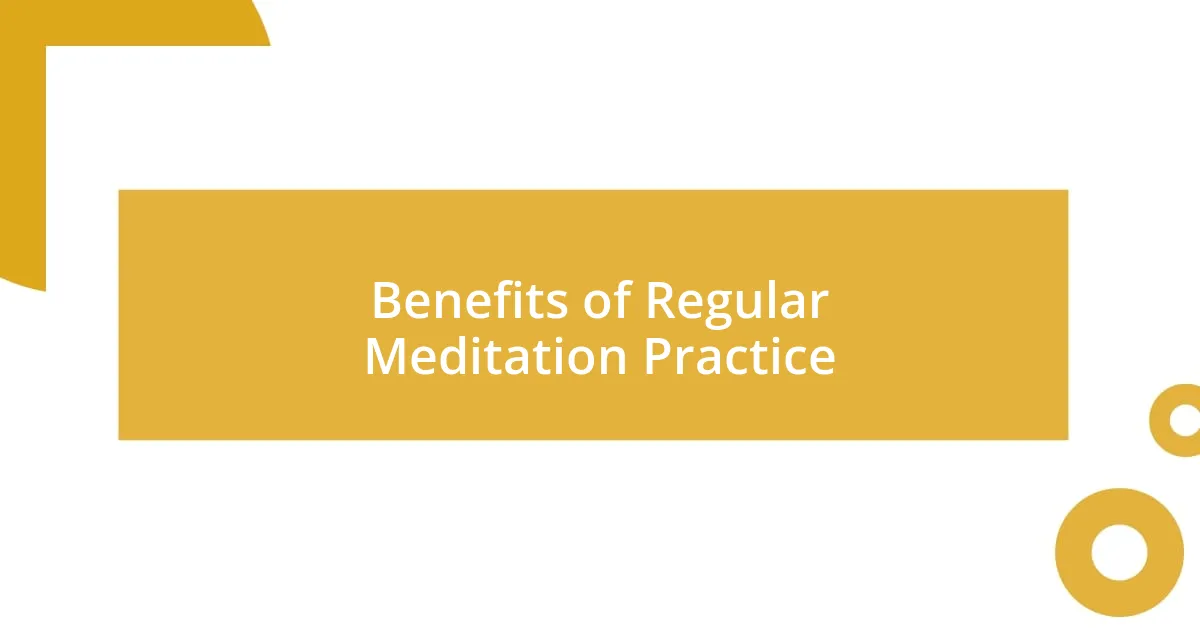
Benefits of Regular Meditation Practice
Meditation offers a bounty of benefits that extend far beyond the moment of stillness. When I started meditating regularly, I noticed my stress levels began to drop significantly. It was like a weight lifted off my shoulders; my mornings became calmer, and I could tackle the day ahead with clarity. Can you imagine how peaceful your mind could feel with just a few minutes of practice each day?
Beyond stress relief, regular meditation can enhance emotional well-being. I’ve found that it helps me manage anxiety and find perspective during challenging situations. One day, while facing a particularly hectic week, I took just ten minutes to meditate. I emerged from that session feeling equipped to handle my responsibilities with a newfound sense of calm and resilience. Have you ever experienced a transformative moment like that through meditation?
Another remarkable benefit is the improvement in focus and concentration. I used to struggle with staying present during tasks, often distracted by my racing thoughts. Since incorporating meditation into my routine, I’ve experienced a dramatic shift. My focus deepened, and I could immerse myself in work without distractions. It’s rewarding to see how such a simple practice can lead to significant changes in both our mental landscape and daily productivity.
| Benefit | Personal Experience |
|---|---|
| Stress Reduction | I felt a weight lift off my shoulders, entering each day with clarity. |
| Emotional Well-Being | After meditating during a hectic week, I found calm and resilience. |
| Focus and Concentration | My ability to concentrate improved significantly, allowing me to work without distractions. |
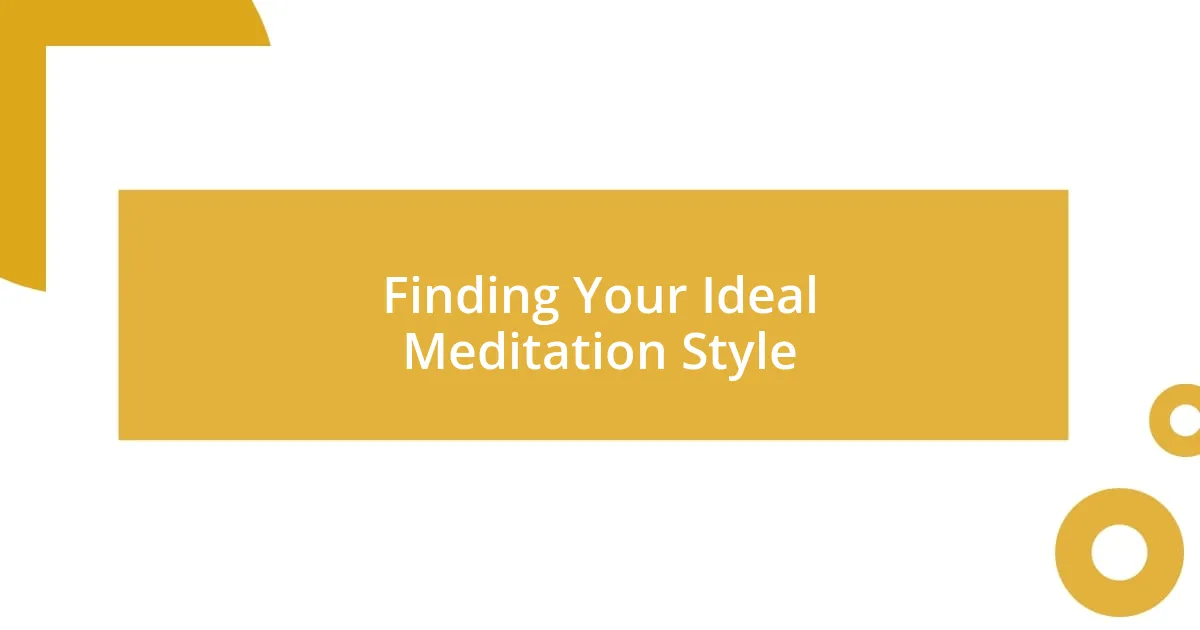
Finding Your Ideal Meditation Style
Finding your ideal meditation style can be quite an adventure. I remember when I first explored different approaches—some felt natural, while others left me scratching my head. It’s all about experimentation. By trying out various styles, such as mindfulness, loving-kindness, or transcendental meditation, I discovered what truly resonated with me. Once, I dove into a movement-based practice, and to my surprise, the rhythm of my breath and body became a meditation in itself. I never expected to find stillness in movement, but that’s the beauty of this journey.
Consider these styles as a starting point for your own exploration:
- Mindfulness Meditation: Focus on the present moment without judgment; I’ve found this grounding.
- Guided Meditation: Follow along with a facilitator; it offers support, especially when you’re just starting.
- Loving-Kindness Meditation: Cultivate compassion towards yourself and others; this has softened my heart in profound ways.
- Transcendental Meditation: Use a mantra for deeper concentration; I was amazed at how simple words could guide my thoughts.
- Movement-Based Meditation: Incorporate gentle movements or yoga; it felt like dancing my worries away.
Embrace the process of discovering what fits your personality and lifestyle. Each style holds the potential for deeper self-connection and growth. As you explore, keep an open mind; who knows, you might stumble upon a practice that makes meditation feel like second nature.
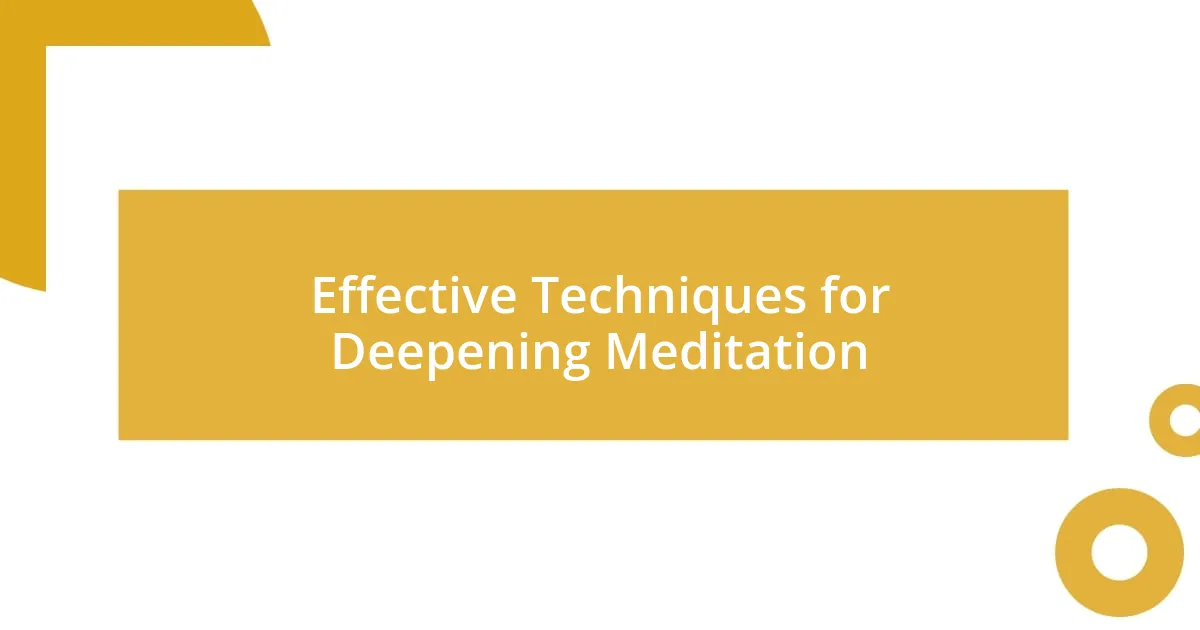
Effective Techniques for Deepening Meditation
One effective technique for deepening meditation is focusing on breath awareness. When I started intentionally observing my breath, it was as if the chaos of my thoughts began to quiet down. It’s amazing how simple it is—just paying attention to each inhale and exhale can bring an incredible sense of calm. Have you ever noticed how your breath can anchor your mind when it starts to wander?
Another powerful approach I’ve found is incorporating visualization during meditation. I remember a session where I imagined myself in a peaceful forest, surrounded by gentle sounds of nature. This vivid imagery not only enhanced my relaxation but also created a strong sense of connection to my surroundings. Visualizing a safe, serene space can be a comforting practice to return to whenever I need a moment of escape. Have you tried visualizing a place that brings you peace?
Finally, I’ve discovered the importance of mantra repetition in deepening my practice. A few years ago, I began using a simple phrase, ‘I am enough,’ during my sessions. This mantra helped quiet my inner critic and allowed me to embrace my authentic self. It’s fascinating how repeating a meaningful phrase can transform the meditation experience. Have you found words or phrases that resonate deeply with you? They might just be the key to unlocking a more profound meditation journey.
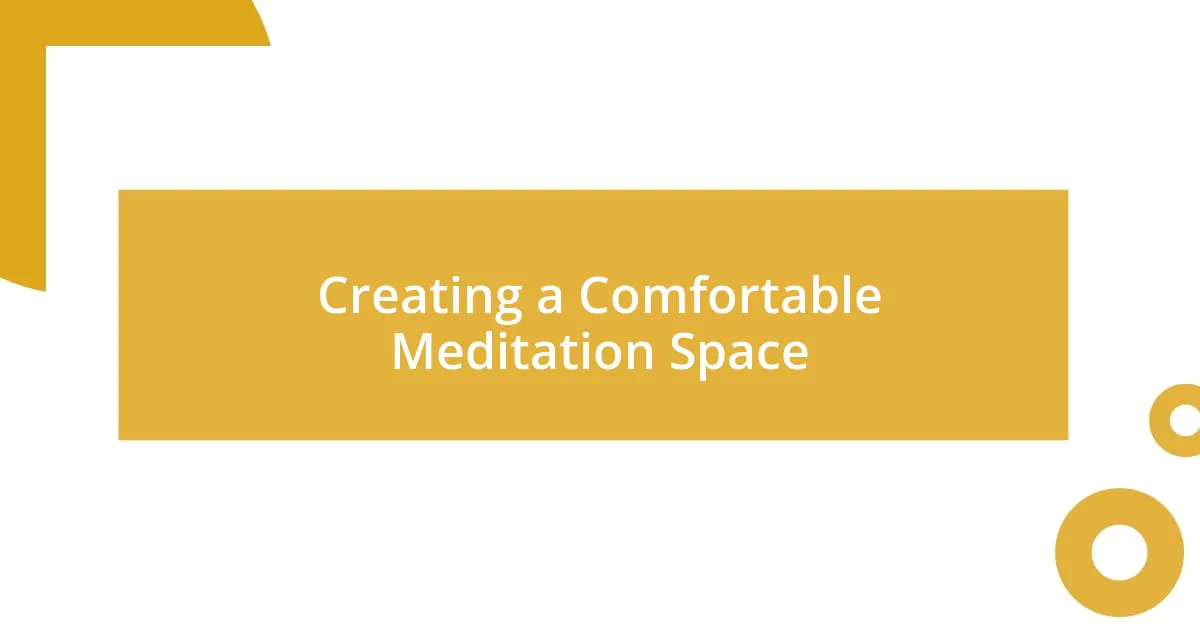
Creating a Comfortable Meditation Space
Creating a comfortable meditation space is essential for nurturing a conducive atmosphere. I remember transforming a small corner of my living room into a serene sanctuary. Just adding a cozy cushion, soft lighting, and a few calming decorations like plants made all the difference. Have you ever noticed how your environment can influence your mindset?
One tip that truly helped me is to declutter my meditation area. The moment I removed distractions and unwanted items, I felt a weight lift off my shoulders. It’s like giving your mind permission to unwind and focus fully on your practice. Adding personal touches, whether it’s a framed picture of a loved one or a small incense holder, can also make the space feel inviting. What elements do you think would make your meditation space special?
I’m a firm believer in creating an engaging sensory environment. For me, gentle music or nature sounds in the background can elevate my experience tremendously. I recall one session where the sound of soft rain created a cocoon of tranquility around me. It allowed my mind to drift deeper than usual. Have you explored the impact of sound in your meditation? Personalizing the sensory elements can turn your practice into something truly magical.
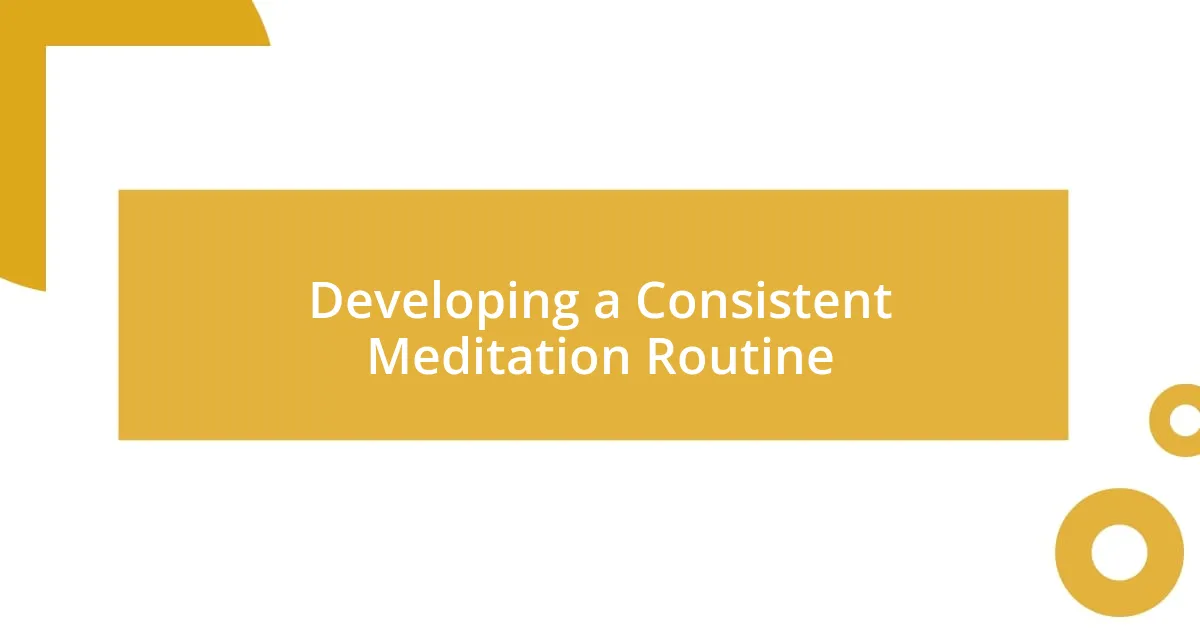
Developing a Consistent Meditation Routine
Developing a consistent meditation routine has been a game-changer for me. I started by scheduling short daily sessions at the same time each day, which made it feel like a commitment rather than a chore. It’s funny how carving out just ten minutes each morning shaped not only my day but also my mindset. Have you ever tried setting a specific time for your practice? It might just help you build that essential habit.
One thing I’ve learned is to be flexible with my routine. There were days when I felt too busy to sit still, but I discovered that even a quick five-minute session could work wonders. On days filled with chaos, I often turn to a guided meditation app just to keep the momentum going. This adaptability has been key; it’s all about meeting myself where I am. Have you found ways to adapt your practice when life gets hectic?
Maintaining a consistent meditation practice also involves tracking my progress. I keep a simple journal where I note how I felt before and after each session. Reflecting on this journey gives me insight into my growth and challenges. Plus, looking back reminds me of the peaceful moments I’ve cultivated. Have you ever considered journaling your experience? It might just add a layer of depth to your practice.
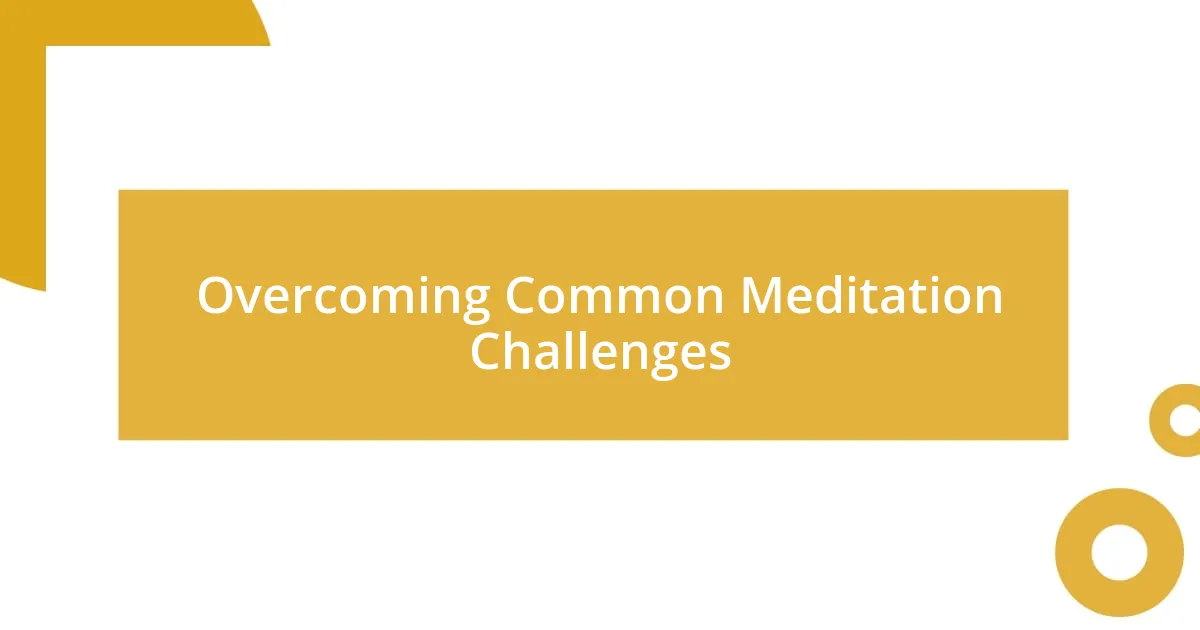
Overcoming Common Meditation Challenges
I can’t tell you how often I’ve struggled with a wandering mind during meditation. At first, I viewed it as a failure, but eventually, I learned to embrace those distractions. I remember one session where my mind raced with thoughts of my to-do list. Instead of getting frustrated, I gently acknowledged those thoughts and returned my focus to my breath. Have you tried treating your wandering mind with kindness? It can turn a challenge into an opportunity for growth.
Setting realistic expectations has also been a vital part of my meditation journey. In the beginning, I was frustrated when I couldn’t achieve that blissful state right away. I learned that it’s perfectly normal for meditation to feel different each day. Some days, I find clarity and calm, and on others, my mind feels like a whirlwind. Accepting this ebb and flow has helped me appreciate even the more turbulent sessions as part of the process. What would happen if you embraced the ups and downs of your practice?
Lastly, while I cherish the quiet moments of meditation, I’ve found that incorporating movement can be incredibly helpful. There have been times when sitting still felt agonizing, so I turned to mindful walking or gentle yoga instead. On one memorable occasion, moving through a slow flow allowed my mind to settle in ways sitting just couldn’t achieve. It changed my perception of meditation completely. Have you thought about blending movement into your practice? Finding what resonates with you can make a world of difference.

